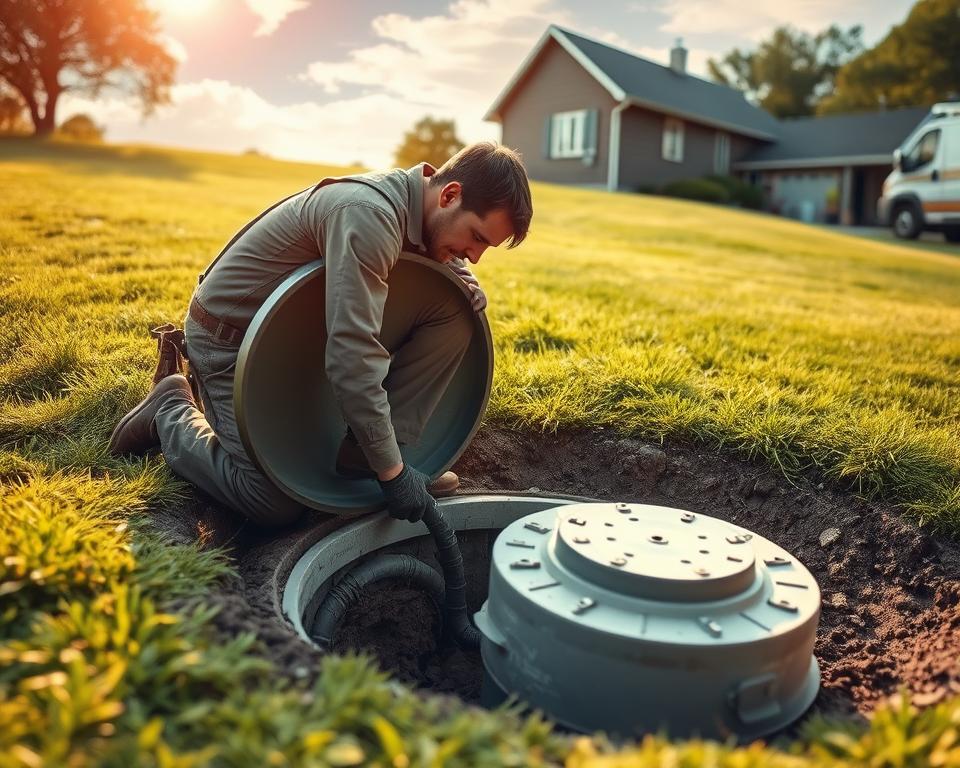Essential Advice for Septic System Pumping
Ever pondered how often you should schedule septic system pumping to avert hefty failures? With in excess of 20 percent of U.S. households using septic systems, grasping their maintenance is crucial. Knowing precisely when to order a septic tank service is key to its longevity. Moreover, homeowners have access to budget-friendly septic pumping services that deliver excellent functionality while staying on budget. This guide covers critical upkeep advice beneficial for every homeowner.
Significant Points
- Routine septic system pumping is essential for smooth operation.
- Identifying the signs that suggest the requirement for service can prevent major issues.
- Selecting licensed septic system pumpers secures top-quality maintenance.
- Cost-effective septic pumping options are within reach for homeowners.
- Periodic inspections promote optimal system performance.
Know How Your Septic System Works
A septic system serves a crucial role in processing household wastewater, comprising several essential components that operate together. The main drain line channels wastewater from your home to the septic tank, where the process initiates. In the tank, an underground chamber, solids settle at the bottom, and bacteria digest these solids, treating the waste efficiently.
The processed liquid effluent subsequently moves from the septic tank to the distribution box, where it is dispersed evenly across the drain field or leach field. Here, the soil continues the filtration, further purify the wastewater. Grasping the functions of these septic system parts is essential. It allows homeowners to supervise and maintain their systems effectively.
Understanding how your septic system functions helps you implement proactive maintenance measures. It’s wise to have periodic meetings with qualified service providers of septic systems – septic system cleaning. They supply crucial insights for peak functioning of your system. These professionals aid in arranging the necessary pump-outs and checks. This diligence can significantly prolong your septic system’s lifespan.
Why Septic System Maintenance Matters
Keeping your septic tank consistently is critical for homeowners who wish their system to remain reliable. A well-cared-for system delivers peace of mind and safeguards your property’s value. Without appropriate care, you’re facing system breakdowns and health dangers.
Selecting a top-notch septic pumping service is crucial. They offer timely inspections and pump-outs, extracting sludge and scum buildup. If maintenance is ignored, last-minute pumping may be required, which is pricey.
Adhering to a consistent maintenance plan is prudent. It entails professional evaluations and regular pumping. This proactive measure helps avoid urgent issues, providing a healthier living environment for everyone.

Warning Signs for Septic Systems
Keeping an eye on septic system issues can avoid costly repairs and major damage. Common signs signal when your system demands a check. These include:
- Sluggish drains throughout the house
- Pooling water in the yard above the drain field
- Bad odors near the septic tank or leach field
- Remarkably lush grass growth in certain areas of your yard
These signs could indicate problems that might cause your system failing. Acting quickly is vital. Calling in septic pumping experts for an inspection aids. Early intervention prevents small issues from growing into major ones. Additionally, regular upkeep secures your system works well and remains durable.
Best Practices for Septic System Pumping
Correct pumping of your septic tank is crucial to sidestep hefty clogs and backups. It’s necessary to determine the right interval for maintenance. Homeowners should generally arrange pumping every 2 to 5 years, subject to the tank’s size and household wastewater levels. Heavy use of garbage disposals may demand more frequent pumping.
Using professional pumpers means your tank gets a thorough clean and check-up. During pumping, professionals look for any issues, such as damaged baffles. Finding these problems early prevents larger expenses and inconveniences later. Scheduled pumping schedules and expert help provide your septic system’s trouble-free operation.
Routine Inspections for Optimal Performance
Regular inspections are vital for your septic system’s effectiveness. Septic system inspections uncover early issues before they worsen. Professionals advise inspections every three to five years, guided by system size and household usage. This prevents expensive fixes.
Holding maintenance records is important for tracking your system’s condition. These records give insights into previous inspections, repairs, and when to schedule septic tank cleaning services. With this information, preparing for future upkeep becomes easier, keeping septic systems in prime shape.
Consistent inspections and detailed record-keeping not only boost system efficiency but also lengthen its life. This method secures the environment and the investment in a safe, operational home.
| Inspection Type | Recommendation Frequency | Benefits |
|---|---|---|
| Visual Inspection | Annually | Identify surface issues |
| Professional Inspection | Every 3–5 years | Assess functionality and detect problems |
| Septic Tank Pumping | Every 3–6 years | Prevent overflow and system failure |
Water-Saving Habits for a Healthier Septic System
Smart water use is essential for keeping your septic system robust. It not only aids the environment but also boosts the performance of your home’s plumbing. By practicing easy, yet effective, conservation methods, homeowners can reduce wastewater.
Spread out your laundry activities over the week instead of doing them all at once. This helps the septic system to handle water better and stops tank overflow. Opting for low-flow fixtures in your kitchens and bathrooms leads to considerable water savings, maintaining the water pressure up while cutting the flow rate, thus trimming the amount of wastewater produced each day.
Promptly fixing leaks is another way to support your septic system. Even a small leak can cause a large waste of water, overburdening the septic system. Through frequent inspections and repairs, you contribute significantly to the system’s efficiency.
Prioritizing water conservation isn’t just beneficial for your septic system; it’s also a step towards sustainable living. Making such practices into everyday habits helps both your household and the planet.
Managing Household Waste Correctly
Homeowners play a crucial role in keeping their septic system’s health by handling household waste correctly. It’s essential to avoid disposing of non-biodegradable items like wipes, plastics, and other damaging products in the system. These items can cause clogs, resulting in expensive repairs and a decrease in efficiency.
Converting food scraps and organic materials is a helpful alternative to sending them to landfill. This practice markedly reduces the amount of solid waste entering the septic tank. Focusing on biodegradable waste disposal helps maintain the ecological balance needed for effective waste management.
It’s essential to watch what goes down the drains. Non-decomposable items can requiredemand more frequent septic tank pumping. By understanding and adhering to correct waste disposal methods, you can secure a more efficient and long-lasting septic system.
Cleaning Product Tips for Septic Health
The health of your septic system largely hinges on your choice of cleaning products. Selecting septic-safe cleaning products is paramount. These products protect the balance of beneficial bacteria that decompose waste. Many standard cleaners include harmful chemicals that jeopardize this balance, leading to pricey repairs or system failure.
Homeowners should look into natural alternatives that are both efficient and environmentally friendly. Common household items like baking soda, vinegar, and lemon juice are superb choices. These natural cleaners are not only good at cleaning but also support your septic system’s health.
Avoiding products that contain antibacterial agents and chlorine bleach is vital. Such substances damage the essential good bacteria, compromising your system’s functionality. By picking sustainable products, you secure both the efficiency and longevity of your septic system.
Why Bacteria Matter in Septic Systems
Bacteria perform a vital role in keeping your septic system efficient. They digest solids naturally and improve nutrient processing. A lack of healthy bacteria can lead to system failure, creating hefty repairs.
Homeowners can improve their system by introducing organic additives. These products raise beneficial bacteria, making waste decomposition more efficient. It’s important to opt for organic additives that are beneficial, not harmful, to the septic environment.
A strong bacterial community is crucial to a septic system’s longevity and efficiency. It stops solid buildup and cuts the need for regular pumping. Emphasizing bacterial health ensures waste management more effective and eco-friendly.
As a Final Point
Septic system care is essential for the life and functionality of your home’s wastewater system. Following essential maintenance tips avoids hefty repairs. Knowing routine pumping and inspections is key. This ensures your septic system keeps in excellent condition.
Becoming knowledgeable of your septic system’s operation and best practices in water and waste management is important. Engaging professionals like All in Sanitation provides expertise. This supports your septic system’s long-term health and provides confidence.
Investing in proper septic maintenance today brings future benefits. It safeguards your home and improves your family’s quality of life. Prioritizing septic system care delivers confidence with a well-maintained system.

